
John Wood Campbell Jr. was an American science fiction writer and editor. He was editor of Astounding Science Fiction from late 1937 until his death and was part of the Golden Age of Science Fiction. Campbell wrote super-science space opera under his own name and stories under his primary pseudonym, Don A. Stuart. Campbell also used the pen names Karl Van Kampen and Arthur McCann. His novella Who Goes There? was adapted as the films The Thing from Another World (1951), The Thing (1982), and The Thing (2011).

Poul William Anderson was an American fantasy and science fiction author who was active from the 1940s until his death in 2001. Anderson also wrote historical novels. His awards include seven Hugo Awards and three Nebula Awards.
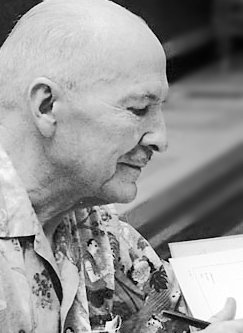
Robert Anson Heinlein was an American science fiction author, aeronautical engineer, and naval officer. Sometimes called the "dean of science fiction writers", he was among the first to emphasize scientific accuracy in his fiction, and was thus a pioneer of the subgenre of hard science fiction. His published works, both fiction and non-fiction, express admiration for competence and emphasize the value of critical thinking. His plots often posed provocative situations which challenged conventional social mores. His work continues to have an influence on the science-fiction genre, and on modern culture more generally.

Theodore Sturgeon was an American fiction author of primarily fantasy, science fiction, and horror, as well as a critic. He wrote approximately 400 reviews and more than 120 short stories, 11 novels, and several scripts for Star Trek: The Original Series.

The Man Who Sold the Moon is the title of a 1950 collection of science fiction short stories by American writer Robert A. Heinlein.

Revolt in 2100 is a 1953 science fiction collection by American writer Robert A. Heinlein, part of his Future History series.

The Lensman series is a series of science fiction novels by American author E. E. "Doc" Smith. It was a runner-up for the 1966 Hugo award for Best All-Time Series, losing to the Foundation series by Isaac Asimov.
Alexei Panshin was an American writer and science fiction critic. He wrote several critical works and several novels, including the 1968 Nebula Award–winning novel Rite of Passage and, with his wife Cory Panshin, the 1990 Hugo Award–winning study of science fiction The World Beyond the Hill.
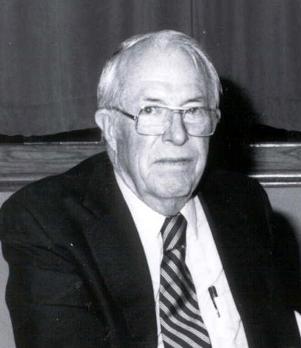
John Stewart Williamson, who wrote as Jack Williamson, was an American science fiction writer, one of several called the "Dean of Science Fiction". He is also credited with one of the first uses of the term genetic engineering. Early in his career he sometimes used the pseudonyms Will Stewart and Nils O. Sonderlund.
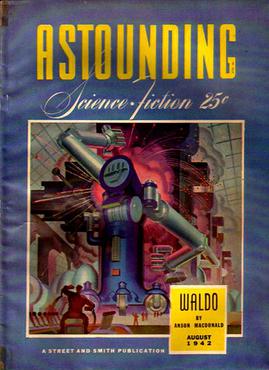
"Waldo" (1942) is a short story by American writer Robert A. Heinlein, originally published in Astounding Magazine in August 1942 under the pseudonym Anson MacDonald. It is available in the 1950 book Waldo & Magic, Inc.. Both stories in that collection involve magic but are otherwise unrelated.

Unknown was an American pulp fantasy fiction magazine, published from 1939 to 1943 by Street & Smith, and edited by John W. Campbell. Unknown was a companion to Street & Smith's science fiction pulp, Astounding Science Fiction, which was also edited by Campbell at the time; many authors and illustrators contributed to both magazines. The leading fantasy magazine in the 1930s was Weird Tales, which focused on shock and horror. Campbell wanted to publish a fantasy magazine with more finesse and humor than Weird Tales, and put his plans into action when Eric Frank Russell sent him the manuscript of his novel Sinister Barrier, about aliens who own the human race. Unknown's first issue appeared in March 1939; in addition to Sinister Barrier, it included H. L. Gold's "Trouble With Water", a humorous fantasy about a New Yorker who meets a water gnome. Gold's story was the first of many in Unknown to combine commonplace reality with the fantastic.
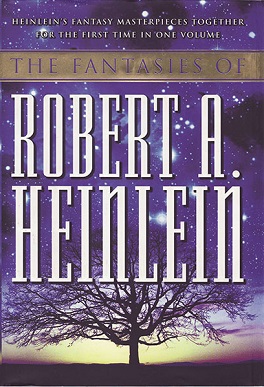
The Fantasies of Robert A. Heinlein is a collection of science fantasy short stories by American writer Robert A. Heinlein.
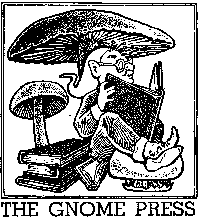
Gnome Press was an American small-press publishing company primarily known for publishing many science fiction classics. Gnome was one of the most eminent of the fan publishers of SF, producing 86 titles in its lifespan — many considered classic works of SF and Fantasy today. Gnome was important in the transitional period between Genre SF as a magazine phenomenon and its arrival in mass-market book publishing, but proved too underfunded to make the leap from fan-based publishing to the professional level. The company existed for just over a decade, ultimately failing due to inability to compete with major publishers who also started to publish science fiction. In its heyday, Gnome published many of the major SF authors, and in some cases, as with Robert E. Howard's Conan series and Isaac Asimov's Foundation series, was responsible for the manner in which their stories were collected into book form.
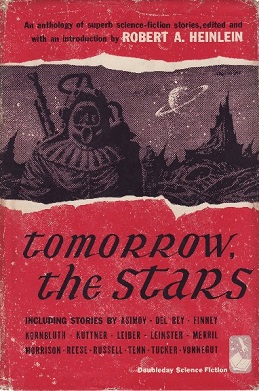
Tomorrow, the Stars is an anthology of speculative fiction short stories, presented as edited by American author Robert A. Heinlein and published in 1952.
The science fiction writer Robert A. Heinlein (1907–1988) was productive during a writing career that spanned the last 49 years of his life; the Robert A. Heinlein bibliography includes 32 novels, 59 short stories and 16 collections published during his life. Four films, two TV series, several episodes of a radio series, at least two songs and a board game derive more or less directly from his work. He wrote the screenplay for Destination Moon (1950). Heinlein also edited an anthology of other writers' science fiction short stories.
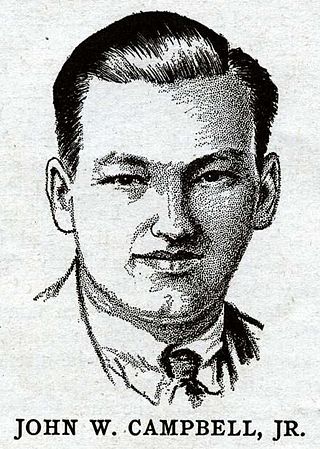
This is a bibliography of works by American writer John W. Campbell Jr.
Advent:Publishers is an American publishing house. It was founded by Earl Kemp and other members of the University of Chicago Science Fiction Club, including Sidney Coleman, in 1955, to publish criticism, history, and bibliography of the science fiction field, beginning with Damon Knight's In Search of Wonder.
Lafayette Ronald Hubbard, better known as L. Ron Hubbard, was an American pulp fiction author. He wrote in a wide variety of genres, including science fiction, fantasy, adventure fiction, aviation, travel, mystery, western, and romance. His United States publisher and distributor is Galaxy Press. He is perhaps best known for his self-help book, the #1 New York Times bestseller Dianetics: The Modern Science of Mental Health, and as the founder of the Church of Scientology.
This is a complete bibliography of works by the American space opera author E. E. Smith.

Science-fiction and fantasy magazines began to be published in the United States in the 1920s. Stories with science-fiction themes had been appearing for decades in pulp magazines such as Argosy, but there were no magazines that specialized in a single genre until 1915, when Street & Smith, one of the major pulp publishers, brought out Detective Story Magazine. The first magazine to focus solely on fantasy and horror was Weird Tales, which was launched in 1923, and established itself as the leading weird fiction magazine over the next two decades; writers such as H.P. Lovecraft, Clark Ashton Smith and Robert E. Howard became regular contributors. In 1926 Weird Tales was joined by Amazing Stories, published by Hugo Gernsback; Amazing printed only science fiction, and no fantasy. Gernsback included a letter column in Amazing Stories, and this led to the creation of organized science-fiction fandom, as fans contacted each other using the addresses published with the letters. Gernsback wanted the fiction he printed to be scientifically accurate, and educational, as well as entertaining, but found it difficult to obtain stories that met his goals; he printed "The Moon Pool" by Abraham Merritt in 1927, despite it being completely unscientific. Gernsback lost control of Amazing Stories in 1929, but quickly started several new magazines. Wonder Stories, one of Gernsback's titles, was edited by David Lasser, who worked to improve the quality of the fiction he received. Another early competitor was Astounding Stories of Super-Science, which appeared in 1930, edited by Harry Bates, but Bates printed only the most basic adventure stories with minimal scientific content, and little of the material from his era is now remembered.















